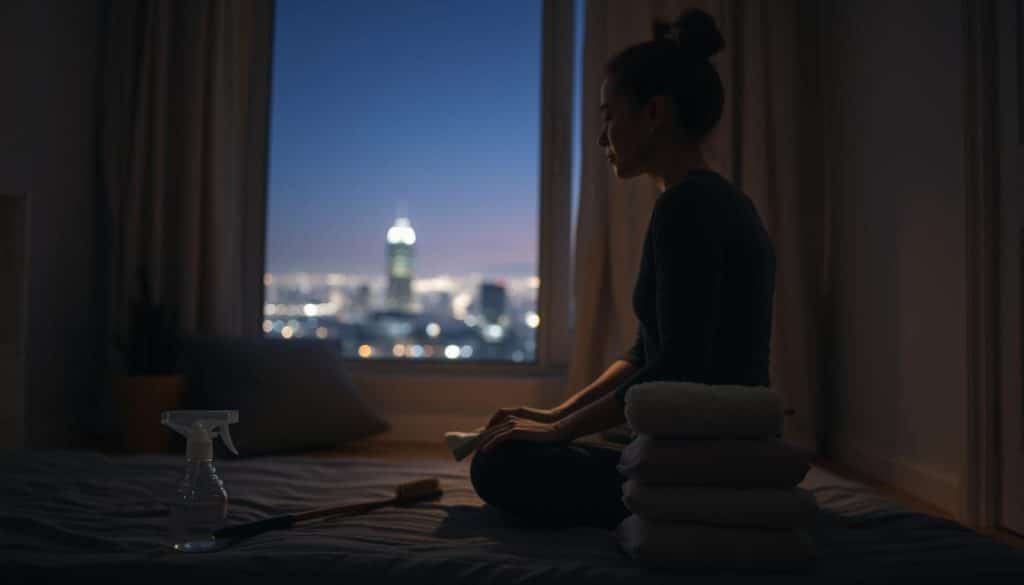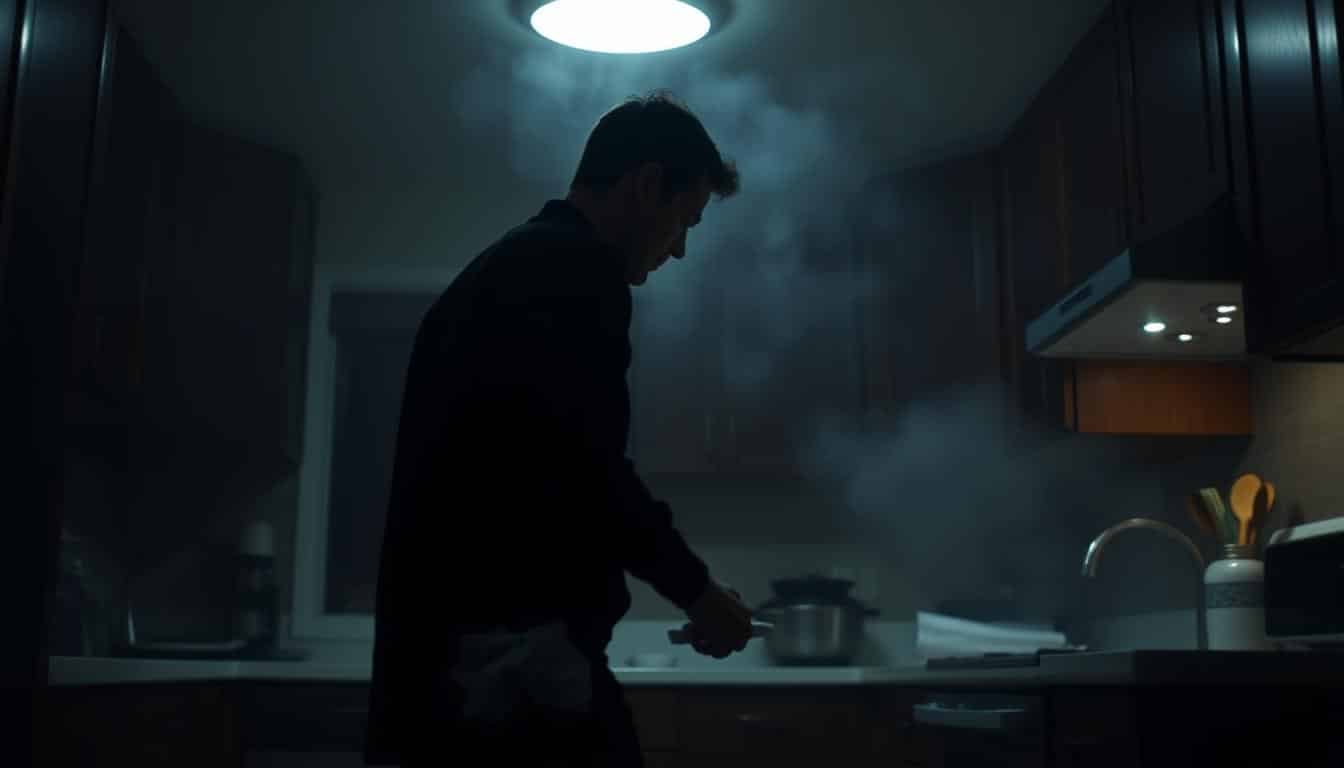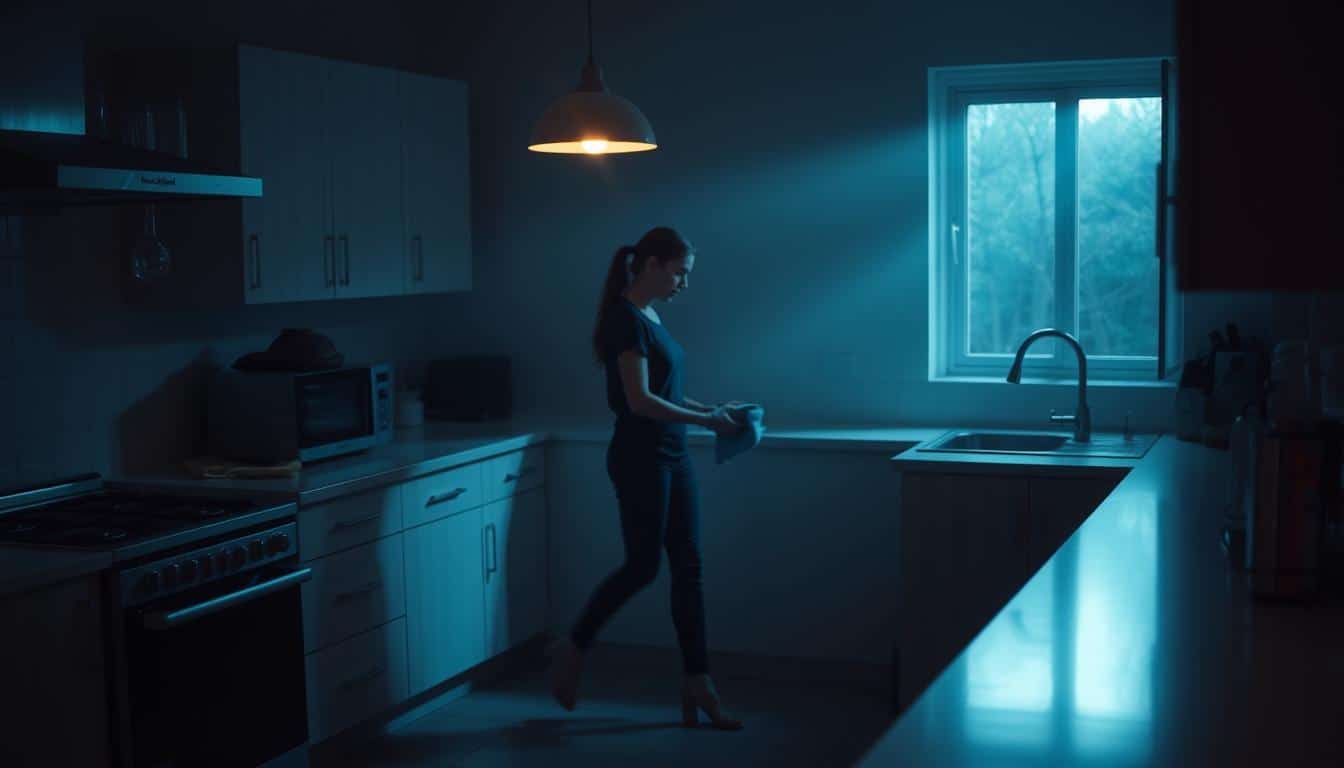Many people find cleaning at night a great way to keep their home neat without disrupting their daily life. Using silent cleaning methods makes it possible to maintain a peaceful environment after dark. Modern cleaning tools are made to be quiet. For instance, some have a quiet-mode that works at about 60 decibels. This cuts down a lot of noise while you clean.
Quiet cleaning techniques let you do necessary chores without much noise. You can fold clothes, clean the fridge, or make beds quietly. This keeps your space serene. Additionally, doing some jobs like sweeping your front steps outside helps avoid louder cleaning inside. This contributes to making your home a more soothing place. Let’s look into these methods more and learn how to bring tranquility into our homes at night.
The Importance of Quiet Cleaning at Night
Keeping things quiet while cleaning at night is key for a peaceful sleep routine. Nighttime noise can mess with your sleep and harm your health over time. Such sounds disturb your sleep, making you stay more in light sleep and less in deep or REM sleep.
This leads to feeling tired during the day, being easily annoyed, and not thinking clearly.
Knowing why quiet cleaning is essential shows us the perks of cleaning at night. It helps with getting good sleep, which is important for thinking clearly and staying calm. Less noise means better mood, focus, and overall happiness. It helps us relax and get ready for a good night’s sleep.
Long-term noise at night can lead to high blood pressure, heart disease, and even stroke. This highlights the need for quiet when cleaning at night. By keeping noise down, we respect everyone’s need for quiet and can still get chores done. This helps maintain the calm needed for good sleep.
Understanding Silent Cleaning Methods for Late Night
Cleaning at night can be hard if you want to keep things quiet. With silent cleaning methods, you can clean up without waking anyone. These ways help keep your home neat while everyone stays peaceful.
There are many quiet cleaning methods that are also effective. Here are some good practices:
- Using soft-bristled brooms instead of loud vacuums to keep things quiet.
- Choosing microfiber cloths for dusting because they are quiet and easy to use.
- Picking spray cleaners that don’t make a lot of noise or mess.
- Using special floor cleaners made for quiet cleaning, perfect for nighttime.
These methods help you clean quietly, so everyone can have a peaceful night. By using these gentle practices, you can clean effectively while keeping things calm. It’s a win-win for cleanliness and serenity.
Creating a Relaxing Environment
To make cleaning more peaceful, work on making the environment calming. A soothing atmosphere can make nighttime cleaning feel like part of your self-care. Change the lighting and add gentle scents to make a big difference. Here, you’ll find easy ways to make your cleaning space peaceful and keep you productive.
Tips for Dimming Lights and Reducing Noise
Right lighting and less noise can turn cleaning into a relaxing experience. Here are some tips for dim lights:
- Use soft, warm-colored bulbs to create a cozy effect.
- Employ lamps instead of overhead lights for a more subdued glow.
- Utilize curtains to block out harsh streetlights and promote a sense of serenity.
And here’s how to reduce noise:
- Choose quieter cleaning tools, such as microfiber cloths.
- Consider employing sound-absorbing materials in your cleaning space.
Using Soothing Scents for a Peaceful Space
Adding calming scents can make your cleaning area more relaxing. Scents positively impact mood and help with relaxation:
- Experiment with essential oils like lavender, chamomile, or eucalyptus.
- Utilize scented candles or incense to fill the space with relaxing smells.
- Add natural air fresheners, like potpourri, made from dried herbs and flowers.
A well-thought-out atmosphere not only aids in quiet cleaning but also supports your mental health at night.
Choosing the Right Tools for Silent Cleaning
Looking for silent cleaning tools can change nighttime routines for the better. Using quiet appliances and eco-friendly products helps keep peace. It’s key to pick the right ones to keep shared areas calm and safe.
Effective and Quiet Cleaning Appliances
Some cleaning tools are better because they’re quiet and work well. Here are quiet options to consider:
- Robotic vacuum cleaners equipped with advanced sound-dampening technology.
- Battery-operated brooms that minimize noise while effectively removing dirt.
- Upright vacuum cleaners designed with quiet motors.
These appliances are not just quiet. They make cleaning at night easy without breaking the silence.
The Benefits of Using Eco-Friendly Products
Using eco-friendly products at night has lots of pluses. They’re quiet and safe, making your home more peaceful. Key benefits include:
- Reduced exposure to allergens and toxins, creating a healthier living space.
- Biodegradable ingredients that are safe for the environment.
- Minimal scent impact, promoting a calming atmosphere.
Choosing these products is good for the planet and keeps your home calm at night.
Silent Cleaning Methods for Late Night
When it gets quiet outside, using silent cleaning methods helps keep peace. It’s about cleaning at night without making noise. This way, you can do what you need to without breaking the late-night calm.
Begin with easy steps like gently dusting furniture. Use soft cloths for this. Microfiber cloths are great because they catch dust easily without needing to push hard. For cleaning floors quietly, opt for lightweight vacuums. Brands like Shark and Dyson make models that are strong but not loud.
For mopping, try a spray mop. It cleans well using less water and is quieter. Also, sweeping with brooms that have soft bristles or rubber edges works well. They’re quiet and keep your floors clean.
Using these silent cleaning methods makes your home calm at night. Choosing the right tools lets you clean without noise. This way, your home stays peaceful, and everyone can rest better.
Developing a Late Night Cleaning Routine
Creating a late night cleaning routine is key for a calm home. It helps keep your home clean with less stress. Neatly planning your cleaning times means less noise and disruption at night.
Establishing Consistency to Foster Calm
It’s important to clean regularly for peace at home. Sticking to a schedule makes it easy to fit in quiet cleaning tasks. This not only eases the chore load but also brings tranquility.
Consider trying these steps:
- Create a weekly checklist of tasks that can be completed quietly.
- Dedicate specific days for different areas of the home.
- Set aside the same time each night for cleaning, fostering a habit.
Best Times to Tackle Different Cleaning Tasks
Timing matters for a night cleaning routine. Quiet hours are best for some tasks to keep the noise low. Here’s how to prioritize:
- Dusting and organizing can be done anytime without much noise.
- Vacuuming is best conducted earlier in the evening before others settle down.
- Wiping down surfaces and cleaning glass can be done just before bedtime.
Dealing with Challenges of Nighttime Cleaning
Cleaning at night has its own problems, especially when you live with others. People being sensitive to noise is a big issue. It’s important to find ways to keep things quiet.
Also, staying focused on cleaning without getting distracted is key. Here are some tips to help you overcome these challenges.
Handling Noise Sensitivity in Shared Spaces
If you clean at night, try these ideas:
- Use Quiet Cleaning Equipment: Pick tools that make less noise, like cordless vacuums or simple brooms and mops.
- Clean in Short Intervals: Work in short times to make noise less of an issue for others.
- Focus on Low-Noise Tasks: Do quieter work like dusting first, and save loud tasks for earlier times.
- Communicate with Housemates: Talk about your cleaning plans with roommates or neighbors to avoid surprises.
- Use Noise-Canceling Headphones: Wearing these lets you listen to music without disturbing others.
Maintaining Focus without Distraction
Keep your focus while cleaning by doing the following:
- Set Specific Goals: Have clear cleaning goals to keep you motivated.
- Create a Distraction-Free Environment: Turn off gadgets or move them away to avoid distractions.
- Use a Timer: Try the Pomodoro Technique with set times for cleaning and breaks.
- Listen to Instrumental Music: Play music without words to help you concentrate.
- Practice Mindfulness: Stay in the moment to make cleaning more effective.
Mindfulness and its Role in Silent Cleaning
Mindfulness makes cleaning more than just chores. It turns it into self-care and peace. Using mindfulness when cleaning lets us be more thoughtful. This makes cleaning feel calm, meaningful, and fun.
How Mindfulness Can Enhance the Cleaning Experience
When we clean mindfully, we pay attention to each move. Deep breaths and focusing on the now make cleaning feel like meditation. This makes our cleaning feel special, changing it from a chore to self-care.
Connecting Cleaning with Calmness and Reflection
Cleaning thoughtfully brings peace and clears the mind. It makes us more intentional and calm. Cleaning then becomes a peaceful moment, improving our well-being.
The Benefits of Silent Night Cleaning for Health
Making cleaning quiet at night brings many health bonuses. It not only makes living areas cleaner. It also helps people sleep better and relax more. Not many realize how a peaceful setting aids health and happiness.
Promoting Better Sleep and Relaxation
Soft cleaning methods help make a relaxing space. Using gentle tools, like microfiber cloths or quiet vacuums, keeps surroundings calm. This improves sleep quality.
- Better comfort leads to sounder sleep.
- A workplace that helps you calm down after busy days.
- Less to distract you means more deep relaxation.
Reducing Stress through Calm Cleaning Practices
Quiet cleaning keeps places neat while easing stress. It lets people focus on productive things without loud noises. Here’s what this method offers:
- A way to deal with nervous feelings.
- Repetitive tasks that bring calmness and focus.
- A neater space without chaos promotes clear thinking.

How to Encourage Family Participation
Getting your family to clean together at night can make chores fun and bring everyone closer. Routine cleaning habits encourage everyone to chip in, making it an enjoyable team effort. With fun cleaning plans, families can bond and keep a calm home, making everyone feel part of the team.
Creating Fun and Engaging Cleaning Routines
Here are some ideas to make cleaning fun:
- Make it a game. Use a timer for tasks and reward with treats or fun activities.
- Play everyone’s favorite music to keep the energy up but focused.
- Give tasks that play to each person’s strengths, so they feel their contribution is important.
These tips can turn routine clean-ups into an exciting group activity, instead of just drudgery.
Fostering Unity without Disturbing Others
Here’s how to clean together without waking the whole house:
- Pick cleaning tools that are quiet to keep the peace at night.
- Use signals to show when tasks need to be done, for smooth teamwork.
- Have a cleaning schedule that splits duties fairly. This keeps everyone in the loop and respects quiet times.
These methods ensure a peaceful home and strengthen family ties, making cleaning a shared, joyful task.
Conclusion
In conclusion, the benefits of silent cleaning at night are huge. It makes our living spaces peaceful, reducing stress and helping us relax. Keeping our homes clean in this way shows how important calmness is, not just for us, but for everyone around us too.
Starting a quiet cleaning routine brings a balance of neatness and peace. We talked about using the right tools, eco-friendly products, and staying mindful while cleaning. These steps bring a calm feeling to our homes. Moving our cleaning time to late-night can really make our lives better.
So, if we try out these lifestyle changes and focus on quiet cleaning at night, we can have a calmer and more organized space. Making these small changes can help everyone. It creates a relaxing environment that helps with both our homes’ cleanliness and our mental health.



